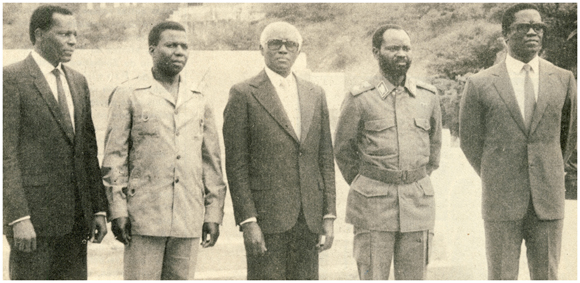Mozambique's International
Relations with the PALOPS and the CPLP
Dossier MZ-0132
![]()

Above: The five heads of state of the Portuguese-speaking countries of Africa, in Cidade da Praia, October 1982. From left to right: José Eduardo dos Santos (Angola), João Bernardo Vieira (Guiné), Aristides Pereira (Cabo Verde), Samora Machel (in military uniform, Mozambique), and Manuel Pinto da Costa (São Tomé e Príncipe). Photo: Naita Ussene.
The heads of state of the former African colonies of Portugal began to meet to discuss matters of common interest in June 1979 in a grouping known informally known as Os Cinco or “The Five”. The first presidential summit took place in Luanda (see the report in Tempo included in the ZIP file below). This grouping replaced the Conferência das Organizações Nacionalistas das Colónias Portuguesas, which had been based in Algiers and coordinated the activities of the various liberation movements. Initially, some of the heads of state favoured admitting Portugal to the group, but President Samora Machel was strongly opposed to the idea. Another attempt to enlarge the group to include the former colonial power was rejected in 1984. In the early years meetings were informal and sometimes intermittent: for example, after the coup in Guiné-Bissau in November 1980 the group did not meet again until August 1982. In 1992 the group formalized the organization under the name Países Africanos de Língua Oficial Portuguesa (PALOPs, or “Officially Portuguese-Speaking African Countries”) In 2011 Spanish-speaking Equatorial Guinea was admitted.
Another international organisation for Portuguese-speaking (or Lusophone) countries is the Comunidade de Países de Língua Portuguesa or CPLP. Together these countries have a total population of around 270 million people. The idea of the CPLP was suggested by the Portuguese politician Jaime Gama in 1983, and a meeting of the seven Lusophone heads of state in São Luís do Maranhão, Brazil, in November 1989 gave it further momentum. The CPLP was officially constituted at a Lisbon summit held in July 1996. Mozambique was one of the seven founding states (the others being Angola, Brazil, Cabo Verde, Guiné-Bissau, Portugal, and São Tomé e Príncipe). Timor-Leste joined when it became independent in 2002, and the organization admitted Spanish-speaking Equatorial Guinea in 2014.
MHN Resources
Consolidated Downloadable Zipped Files
Click on the yellow folder image below to download an unsorted zipped archive of over 220 documents and press clippings in PDF format concerning relations between the Mozambican government and the PALOP and CPLP organisations.
![]()



![Aluka: Struggles for Freedom [subscription required] Struggles for Freedom](imgs/aluka_200.png)



